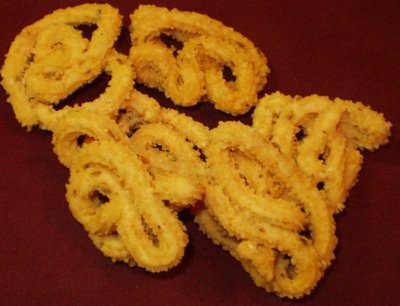 murukulu - all ready to be gobbleed up
murukulu - all ready to be gobbleed upMurukku is a Deepavali tradition in our house. My mom would make these a day or two before the festival but preperations for this dish would start atleast 3-4 days ahead of the actual murukku making day because everything was made from scratch i.e. the flours, I mean.
The rice would be soaked in water for about an hour or two then it would be air-dried on a cotton cloth overnight. The next day, it would then be slow roasted in a pan on the stove in batches, then cooled. The urad dal would undergo the same process, except the soaking bit. It would just be roasted on the stove, then cooled. Then came our kids' chore of taking it to the flour mill to get the rice and urad dal mixture powdered to make into flour. My mom would give us special instructions to relay to the flour mill guy, to not combine the murukku mixture with any other grains (like wheat, jowar etc). She would even send with us some raw rice so the flour mill person could pour that in the mill before the actual Murkku grains went in so it would "clean" out the mill so it is devoid of the afore mentioned other grains. Going to the flour mill was the chore I hated the most growing up. I would always find ways to pawn the chore off to my siblings but it hardly worked :).
For those who are not familiar with the "flour mill(s)" I mention, these are usually one room establishments (atleast where I grew up), where they powder whatever you take. Be it be jowar grains, lentils, rice, wheat, anything you name it, they powder it for you to make into flour. Since it was only a one room place, that meant that the waiting area where you waited for your grains to be pounded was right next to the big machine that powdered the grains which also meant you would be covered in flour by the time you walked out of there. Sure you could wait outside on the street but I always loved to wait inside where I could watch the flour mill operator operate the big machine which also meant I was keeping a close watch on the grains I took so they are not adulterated by anything else :). Sometimes, there would be a line of "dabbas"/"boxes" and you would set your box in line and wait. Sometimes, you would be the only person there. It all depended on the time of year and the time of the day. Festive season would always be a busy time where everyone would bring those "special grains" get powdered - chana dal (for besan), rice (for murukku, chakili etc). During non-festive season, it would just be atta grains - wheat, jowar etc.
Wow...that was a walk down the memory lane I never intended to write about when I started this blog post :). When I look back, if feels as to how less complicated life was back then or so it seems :).
To make murukulu, you need a special gadget called the "murku maker/press". There are a couple to three of varieties of these and I have the one below. I like find this type because I feeel it is much easier to use than the makers, you have to "press". This one you just rotate and the disc on one end of spring sort of thing pushes down on the dough that is in the cylinder!
 muruku maker/press
muruku maker/pressSoftware
---------------
- 4 cups Rice flour
- 3/4 cup Urad dal flour
- 1/4 White Sesame seeds
- 3 tablespoons Cumin seeds
- 1 tablespoons Ajwain seeds
- 1 tablespoons Ginger-Garlic paste
- 1 tablespoon Chili powder
- 4 tablespoons melted butter/shortening
- oil for deep frying
Hardware
---------------
- One large mixing bowl
- One small mixing bowl
- Large deep fryer
Method
---------------
- Mix everything listed under the ingredients together in the large mixing bowl.
- Now take about a cup of the flour mixture into the small mixing bowl, and by adding enough water make a dough that is not too tough or not too watery. It should be easily "pinchable".
- Put this dough mixture in a Muruku maker and press or turn away (depending on what kind of press/muruku maker you are using) onto a clean cotton cloth or some aluminium foil into small disks as in the picture.
- Meanwhile heat up the oil and deep fry the murkus in hot oil until well cooked and crunchy.
Tips and Techniques:
- When making murukus in large batches, make sure that you do not make the dough all at once. Combine all the dry ingredients together and only make the dough when ready to put the dough into the mould.
This my second entry to
Vee's Special Edition Jihva for Diwali Treats !














 Pineapple Kesari from Letzcook
Pineapple Kesari from Letzcook




